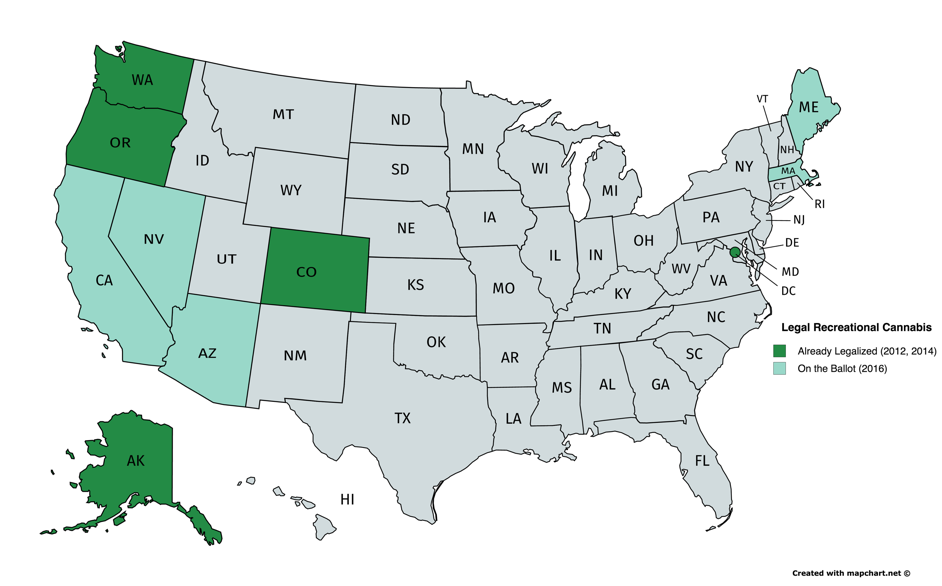Casual observers and the millions who have tuned in to watch the Presidential debates might be unaware of the other important vote taking place tomorrow: cannabis legalisation. While the omission of any question on climate change during the three Presidential debates garnered widespread attention, the legislation of this soft drug was the second major absentee in the televised clash between Hilary Clinton and Donald Trump.
On November 8th, US citizens will not only elect a new President; initiatives to legalise recreational cannabis are also on the ballot in five states. There is a good chance that disappointed Trump or Clinton supporters will be able to drown their sorrows with legal marijuana in California, Nevada, Massachusetts, Arizona and Maine. The map of legal recreational cannabis is about to expand further, covering the whole West Coast and almost 23 per cent of the US population. Legalisation is leading in the polls in Colorado, Washington State, Alaska and Oregon.
Activists and proponents of cannabis reform hope that another round of victories at the ballot box will create ripple effects and force the federal government’s hand to reform cannabis prohibition. In the context of shifting public opinion on cannabis legalisation and a growing number of states with legal recreational cannabis, election day 2016 is poised to represent a milestone for cannabis legalisation.

Presidential Politics and Cannabis Legalisation
Where do Clinton and Trump stand this issue? Surprisingly, in a presidential campaign that has featured the issue of drug use and abuse prominently, the legal status of marijuana has been mostly absent from the conversation. The reason might be that there is little difference on the issue between the Democratic and Republican contender. Both candidates are in favour of medicinal marijuana and allowing states to experiment with recreational cannabis. Neither of them has proposed to go substantially further and repeal federal prohibition.
Thus, neither major party candidate has gone as far as the third-party candidates. Both Gary Johnson (Libertarian Party) and Jill Stein (Green Party) actively campaign for and on the issue of cannabis legalisation. The Libertarian Party’s platform reads ‘we favor the repeal of all laws creating “crimes” without victims, such as the use of drugs for medicinal or recreational purposes.’ The Green Party’s platform calls ‘for an end to the “war on drugs,” legalization of drugs and for treating drug abuse as a health issue.’ In contrast, both Hillary Clinton and Donald Trump aim to stick with the tenuous status quo of allowing states to set their own legislation.
While Hilary Clinton has endorsed reclassifying cannabis, which would facilitate research and medical access, her approach has been called “cautious” and “wary” as it stops there. On the other hand, the Democratic platform goes further, including an unprecedented commitment to reform. Bernie Sanders and his delegates used their influence to insert the following sentence in the Democratic Platform: ‘we encourage the federal government to remove marijuana from the list of “Schedule 1″ federal controlled substances and to appropriately regulate it, providing a reasoned pathway for future legalization.’
Donald Trump, while providing some of his trademark vacillation and bravado talking about drugs, has demurred from speaking much about cannabis legalisation. He has stated repeatedly that it should be a state issue and has left it at that. The issue fared poorly in deliberations over the party platform because Republican proponents of cannabis reform, such as Rand Paul or Rick Perry, neither amassed enough delegates nor leverage. The agreed-upon Republican Platform mentions cannabis only in passing and without any clear policy prescription.
In sum, both Clinton and Trump propose to continue with President Obama’s approach of kicking the can down the road by maintaining federal prohibition whilst tolerating state-level legalisation. While not necessarily the best policy, accommodating experiments in the “laboratories of democracy” represents smart politics: it fits with Republican notions of states’ rights and federalist self-determination, but is also consistent with the overwhelming support cannabis legalisation enjoys among the Democratic base. Thus, independently of who prevails between Hillary Clinton and Donald Trump and is elected 45th President of the United States, forceful leadership on cannabis policy should not be expected.
State-level Ballot Initiatives
Yet, voters are doing what politicians have failed to do and states are taking the lead. For good or ill, popular initiatives and ballot measures have been used to advance cannabis legalization on the state level. In 2012, voters in Washington State and Colorado—in an unprecedented move—opted for legalising recreational cannabis for adult consumption. In 2014, marijuana legalisation received majoritarian support of voters in Alaska, Oregon and Washington DC. Cannabis has not always fared well on the ballot, Proposition 19 lost in California in 2010, and, a poorly conceived and widely maligned proposal lost out in Ohio in 2015.
However, this year cannabis legalisation is set to achieve major victories.
The most important cannabis vote will take place in California. Proposition 64 legalises adult nonmedical use of marijuana, creates a system for regulating marijuana businesses and products, and, imposes taxes on sales and cultivation. As the state with the largest population, cannabis legalisation in California will have an outsized importance, in symbolic, political and monetary terms. There are good chances for approval, as proponents enjoy a significantly advantages in campaign funds and Proposition 64 enjoys stable support of about 60 per cent according to opinion surveys.
In Massachusetts, Maine, Arizona and Nevada, cannabis legalisation faces tougher and closer contests. Proponents are seeking to establish a foothold in the Northeast. In deep-blue Massachusetts, Question 4 has been opposed by the Governor, Attorney General and Mayor of Boston, but enjoys sizeable public support. Similarly, in Maine, Question 1 seems poised to succeed. In the West, cannabis legalisation faces a more hostile climate. Nevada’s Question 2 is strongly opposed by the conservative casino mogul Sheldon Adelson, yet enjoys narrow public support according to polls. Arizona’s more conservative and older electorate represents an uphill battle for legal recreational cannabis and polling has suggested a split between proponents and opponents of Proposition 205.
The outcome of these votes is something to watch on Election Day. Any substantial increase in the number of states with legal recreational cannabis for adult consumption would represent an important milestone for US drug policy reform. First, it makes a policy reversal from the newly elected President less likely. As Caulkins, Kilmer and Kleiman note: ‘If a number of states add momentum to the legalisation movement by legalising large-scale production then even a fairly determined anti-marijuana president might not dare to act aggressively to end the march of legalization.’
Second, the expansion of state-level cannabis legalisation will provide momentum and urgency for further-going reforms. As the Editorial Board of New York Times writes: ‘Passage of these proposals should increase pressure on the federal government to change how it treats marijuana.’ Thus, whether the electoral map turns predominantly red or blue on November 8th green might have to be added to the mix.






